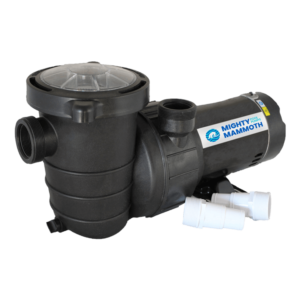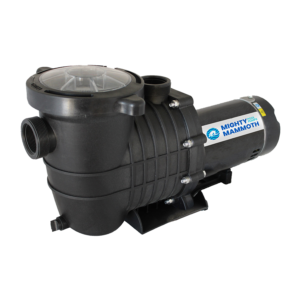
Pool Owner’s Guide to Purchasing & Maintaining Your Pool Pump
 You probably don’t think too much about your pool pump — until it stops working or you have to buy a new one. Then, they can be a little intimidating. Today we’re breaking things down and answering some of the top questions pool owners have about pumps for above ground pools and showcasing some common pool pump issues. Hopefully, this will help you troubleshoot any problems you come up against and make smart purchasing decisions.
You probably don’t think too much about your pool pump — until it stops working or you have to buy a new one. Then, they can be a little intimidating. Today we’re breaking things down and answering some of the top questions pool owners have about pumps for above ground pools and showcasing some common pool pump issues. Hopefully, this will help you troubleshoot any problems you come up against and make smart purchasing decisions.
What does a pool pump do?
To start, it’s important to understand what your pool pump does. Your pool pump circulates the water through your pool and filtration system. It’s important to prevent stagnant water and keep your pool clean, fresh, and ready for swimming.
 What are the different types of pool pumps?
What are the different types of pool pumps?
There are currently three main types of pool pumps on the market:
- Single-Speed Pumps
- Dual-Speed Pumps
- Variable Speed Pumps
Single-Speed Pumps
Single-speed pumps are the original of the three pump types, and the most common.
- The motor spins the impeller at one speed (high) according to the horsepower of the motor. The speed cannot be reduced or increased.
- The high speed means it uses more energy and is considered less efficient than other models. Because of that, some states prohibit installing new single-speed pool pumps to cut back on electricity usage.
Dual-Speed Pumps
As the name implies, this type of pool pump has two speed options — low and high.
- The low-speed setting adds more energy efficiency to your pump, since you can set the pump to run at a low speed, you use less energy. However, the low speed isn’t as efficient at water turnover as the high speed.
Variable speed pumps
While most other pumps use an induction motor, a variable speed pump uses a permanent magnetic motor (PMM) and doesn’t require electricity to spin the rotor.
- Variable speed pumps are often considered the best option because there’s less friction and noise, and they are more efficient than other pool pumps.
- These types of pumps can be digitally regulated to any speed.
- They are more expensive than other models.
What factors should I consider when buying a pool pump?
When shopping for a few pump, here are a few key things to keep in mind:
- Horsepower. A higher horsepower pump is going to turnover the water more quickly. However, you want to make sure the pump works with the filter system so that you don’t overload it.
- Pump motor voltage. Generally, pool pumps require an outlet or they’re hardwired into your electrical system. Make sure you’re getting the one that works for your pool and that you have a place and extension cord to plug it in if need be.
- In ground or above ground. This may seem straightforward, but you’ll want to be sure you buy the correct type of pump for your pool and filter system. Generally, in ground pumps are self-priming and have a higher flow rate. Above ground pumps are generally not self-priming and work best in smaller pools.
- Cost. You want to find a pump that won’t break the bank but will also get the job done. Do your research and do some price comparisons online to be sure you’re getting the best bang for your buck.
What size pump do I need?
If you want to keep your pool clean and sanitary, you need your pool pump to be just the right size. You want the pump to be large enough to turnover (completely filter) all the water more than once per day. Here are the factors you need to look at when determining what size pump you need for your pool:
- Pool size (aka how many gallons of water in the pool)
- Turnover time (aka the time it takes to cycle the entire pool capacity through filter system)
- Flow Rate (how many gallons per minute is pushed through the filter) .
Here are the general guidelines for your pool:
- Pools 24 feet or smaller (less than 15,300 gallons) use a 1 HP pump
- Pools that are more than 24 feet (more than 15.300 gallons) use a 1.5 HP pump or larger.
If your pool is in the “in-between” sizes, it might be the best option to size up. However, no matter what pump you pick, the pump needs to be sized to meet the filter’s flow rate. As noted above, if the pump doesn’t work with the filter system, you may overload both the pump and the filter system.
How to prime your pool pump
Pumps need water to work properly. Without it, heat and friction build up, overheat the motor, and it could break down. So, when you’re opening your above ground pool for the season and there’s air in the system, you’ll need to prime the pump.
Some of today’s pumps are self-priming, but some aren’t. If you need to prime your pump manually, here’s how you do it:
- Switch the pump to off, unplug the cords, and disconnect power to the pump.
- Close the valves on the pump.
- Check if your filter has an air relief valve. Use that to let the air out and release any pressure. If your pump doesn’t have an air relief valve, use the strainer lid to let out the pressure. Once the air is out, you should see water start flowing.
- Remove any debris from the strainer basket. Once cleaned, you can return the basket to its place.
- Add water to the strainer. Fill it up and put the strainer lid back on.
- Turn on the pump and slowly open one suction side valve. Water should start flowing through the pump momentarily. If not, turn off the pump and repeat the process.
- Once the water is flowing through the pump, you can open the other valves one at a time and you should be good to go!
Common pool pump issues
Let’s take a look at some of the most common pump issues that we see.
The pool pump is noisy
If your pump is making a gurgling or vibrating sound, it could be due to a lack of water — also known as cavitation. To fix it:
- Check suction lines to make sure they’re not clogged or closed off.
- Check skimmers to make sure they’re clear of debris.
If neither of the above seem to be the issue, you may have gotten a pump that’s too powerful for your pool. In that case, you may need a smaller pump.
If it’s a louder, screeching noise, it could be the bearings inside the motor. Unless you’re really familiar with motors, you may need to have a professional look at your pump or replace it.
The pool pump is leaking
There’s nothing worse than leaks around your swimming pool. If you notice a pool leak, it could be caused by your pump. To fix it:
- Check the seals and o-rings on your pumps for any cracks, wear and tear, or other damage. Sometimes your pump may be under warranty and you may be able to replace the damaged part; other times you may need to invest in a new pump.
If you don’t notice cracks or damage, the leak may be coming from somewhere else — in which case, you’ll have to do a little more digging.
Read Now:
Leaking Swimming Pools – Pool Liner Leaks and Beyond
Swimming Pool Leak Detection 101
The pool pump won’t start
If your pool pump won’t turn on or turns off right away, it could be an electrical issue. To fix it:
- Check for loose connections.
- Check for blown fuses.
- Make sure the pump isn’t overloaded.
- Double-check that the pump was hooked up and wired correctly.
If that doesn’t solve the problem and it doesn’t seem to be an electrical issue, your motor could be jammed and not able to rotate properly. If that’s the case, simply unplug the pump and safely remove the debris.
The pump motor overheats
An overheating motor could be caused by a few factors — including the summer sun and hot temperatures outside. To fix it:
- Make sure the motor fan is not broken and that it’s free of debris to ensure proper ventilation.
- Shade the pump from direct sunlight and avoid overworking it on super hot days.
- Check the wiring and voltage and adjust if needed.
Signs you need a new pool pump
If it’s time to replace your pool pump, don’t wait. If you do, it won’t be long until your pool is no longer clear or safe to swim in. Not sure if it’s time for a replacement? Here are two clear signs you need a new pool pump…
Your pump is old
Generally, pool pumps and filter systems are made to last for about 10 years. Check your manual or maintenance guide to see how long your pump is expected to last.
- Older pumps tend to have more issues and work less efficiently, so an upgrade may be in your best financial interest.
- Replacement parts and service may not be available for older models, which means you may have no choice but to upgrade if your pump can’t be repaired.
Keep in mind that proper pool maintenance and care can have a big impact on how long your pump — and your pool itself — keep going. The better care you take of your pool, the longer the pump and other pool parts and accessories will last.
Your pump keeps breaking down after repairs and fixes
If you keep having the issues noted above over and over again, it might be most time and cost-effective just to replace the pump. You always want to weigh the pros and cons and make sure you’re making the smartest financial decision. If it costs more to repair than to replace the pump, it might be worth the upgrade.
Hopefully this you get a little more comfortable with your pool pump. If it’s time for a new pump or you have questions about your pool, the team at LinerWorld is here to help.



